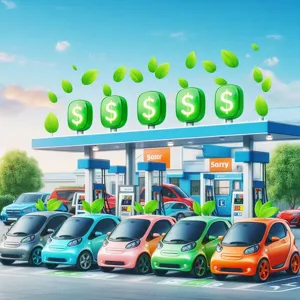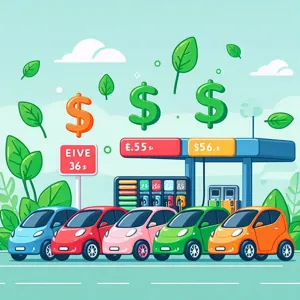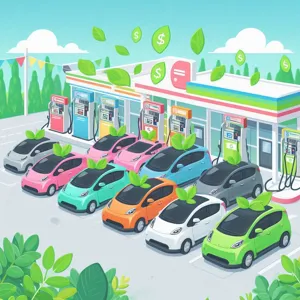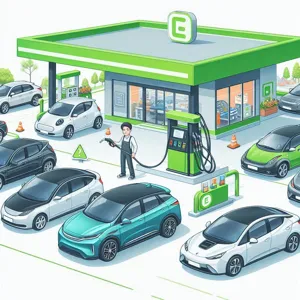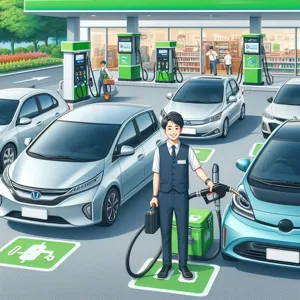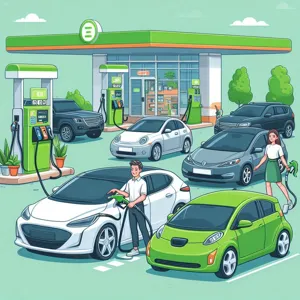As the world becomes increasingly aware of the impact of our choices on the environment, the demand for fuel-efficient vehicles has surged, and for good reason.
With rising fuel prices and concerns about climate change, choosing a car that minimizes fuel consumption not only saves you money but also contributes to a greener planet. From sleek sedans to versatile SUVs, the market is now brimming with innovative vehicles designed to make every journey as eco-friendly as possible. In this blog post, we’ll explore the top 10 fuel-efficient cars that not only deliver impressive mileage but also boast cutting-edge technology and stylish designs. Whether you’re a daily commuter or an adventurous road tripper, these vehicles promise to enhance your driving experience while keeping your carbon footprint in check. Join us as we dive into the world of sustainable driving and discover which cars are paving the way to a more environmentally conscious highway experience!
1. Introduction to Fuel Efficiency and Its Importance
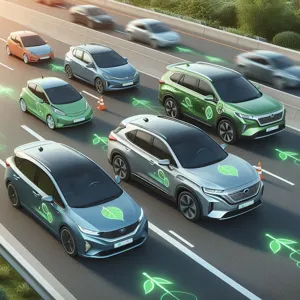
In an era where environmental consciousness is at the forefront of consumer preferences, fuel efficiency has emerged as a pivotal factor for both car buyers and manufacturers. As the world grapples with the realities of climate change and rising fuel prices, the demand for vehicles that offer better mileage and lower emissions has never been greater. Fuel-efficient cars not only lessen the impact on the environment by reducing greenhouse gas emissions but also provide substantial financial savings for drivers through decreased fuel consumption.
Understanding the importance of fuel efficiency goes beyond just the numbers on a sticker; it involves recognizing the broader implications for our planet and our wallets. With each gallon saved, we collectively contribute to lessening our carbon footprint, promoting cleaner air, and paving the way for a sustainable future. Additionally, as fuel prices continue to fluctuate, opting for a vehicle that maximizes fuel economy can lead to significant long-term savings, making it a wise investment for many drivers.
This blog post will delve into the top 10 fuel-efficient cars on the market today, highlighting their features, performance, and the ways they contribute to a greener highway experience. Whether you’re a daily commuter, an eco-conscious consumer, or simply seeking to reduce your fuel expenses, discovering the right fuel-efficient vehicle can transform your driving habits while making a positive impact on the environment. Join us as we explore the best options available to help you make an informed decision on your next car purchase.
2. Criteria for Selecting Fuel-Efficient Cars
When it comes to selecting the most fuel-efficient cars, a few key criteria can help guide your decision-making process. Understanding these factors will not only lead you to vehicles that conserve fuel but also contribute to a more sustainable driving experience overall.
**1. Fuel Economy Ratings:** The first and foremost criterion is the car’s fuel economy, typically measured in miles per gallon (MPG). Look for vehicles that excel in both city and highway ratings. Hybrid and electric vehicles often top the charts, but many conventional gasoline engines are also designed to maximize efficiency.
**2. Engine Technology:** The type of engine can significantly impact fuel efficiency. Smaller engines, turbocharged units, and those that utilize advanced technologies like direct fuel injection often provide better mileage. Additionally, hybrid vehicles combine a traditional engine with an electric motor, resulting in reduced fuel consumption.
**3. Weight and Aerodynamics:** A car’s weight and design play crucial roles in its fuel efficiency. Lighter vehicles generally require less energy to move, while streamlined designs reduce air resistance. When selecting a car, consider models that boast a lightweight structure and a sleek, aerodynamic shape.
**4. Transmission Type:** The type of transmission can also influence fuel efficiency. Continuously Variable Transmissions (CVTs) and modern automatic transmissions with more gears tend to provide better fuel economy than traditional manual transmissions. They allow the engine to operate at its most efficient RPM, optimizing fuel usage.
**5. Driving Technology:** Many modern cars come equipped with advanced driving technologies that enhance fuel efficiency. Features like stop/start systems, regenerative braking, and eco-driving modes can contribute to reduced fuel consumption. Look for these features in the models you’re considering.
**6. Environmental Impact:** Beyond just fuel efficiency, consider the overall environmental impact of the vehicle. This includes emissions ratings and the use of eco-friendly materials in the car’s construction. Vehicles with lower emissions not only save you money at the pump but also contribute to cleaner air and a healthier planet.
By evaluating cars based on these criteria, you can make an informed choice that aligns with your environmental values while still enjoying the benefits of a reliable and efficient vehicle. Whether you’re commuting to work or taking a weekend road trip, choosing a fuel-efficient car is a significant step toward a greener highway experience.
3. Overview of Hybrid vs. Electric vs. Traditional Fuel Cars
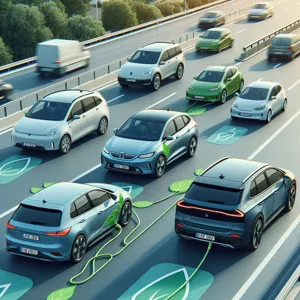
When it comes to choosing a fuel-efficient vehicle, understanding the differences between hybrid, electric, and traditional fuel cars is essential for making an informed decision. Each option comes with its own set of advantages and considerations, impacting not only your wallet but also the environment.
**Hybrid Cars**: Hybrid vehicles combine a conventional internal combustion engine with an electric motor, allowing for improved fuel efficiency without requiring the driver to compromise on range. These cars seamlessly switch between the electric motor and the gasoline engine, optimizing performance based on driving conditions. Hybrids are particularly advantageous for urban commuting, where stop-and-go traffic allows the electric motor to take over, reducing fuel consumption significantly. With an array of models available, hybrids often deliver the best of both worlds: the power of gasoline and the eco-friendliness of electric energy.
**Electric Cars**: Electric vehicles (EVs) run entirely on electricity, powered by large battery packs that must be recharged regularly. With zero tailpipe emissions, EVs represent the forefront of eco-friendly technology and are celebrated for their minimal environmental impact. As charging infrastructure continues to expand, driving an electric car is becoming increasingly practical for daily use. While they may require a higher initial investment, the long-term savings on fuel and maintenance can be substantial. Plus, many governments offer incentives for EV purchases, making them an appealing choice for those looking to contribute to a greener future.
**Traditional Fuel Cars**: Traditional gasoline or diesel vehicles have been the backbone of the automotive industry for decades. While advancements in engine technology have led to more fuel-efficient models, these cars still rely on fossil fuels, contributing to greenhouse gas emissions. However, traditional fuel cars often come with a lower purchase price compared to hybrids and electric vehicles, making them immediately accessible to a wider audience. For drivers who frequently travel long distances or live in areas with limited charging infrastructure, traditional fuel cars may still be the most practical choice.
In summary, whether you’re drawn to the efficiency of hybrids, the sustainability of electric vehicles, or the familiarity of traditional fuel cars, each option has its unique benefits and drawbacks. By assessing your driving habits, budget, and environmental priorities, you can find the fuel-efficient vehicle that best suits your lifestyle while contributing to a greener highway experience.
4. Top 10 Fuel-Efficient Cars of [Current Year]
As the demand for sustainable transportation continues to rise, automotive manufacturers are stepping up their game, offering a range of fuel-efficient vehicles that not only help reduce your carbon footprint but also save you money at the pump. In [Current Year], several models stand out for their impressive fuel economy, innovative technology, and eco-friendly features. Here’s a closer look at the top 10 fuel-efficient cars that are making waves on the market this year:
1. **Toyota Prius**: A perennial favorite, the Prius remains a symbol of hybrid innovation, boasting an impressive fuel economy of up to 56 mpg. With its sleek design and advanced safety features, it’s perfect for eco-conscious drivers.
2. **Honda Insight**: This stylish sedan combines the best of both worlds—fuel efficiency and performance. With an estimated 52 mpg combined, the Insight offers a smooth ride and a spacious interior, making it ideal for families on the go.
3. **Hyundai Ioniq Hybrid**: known for its exceptional efficiency, the Ioniq Hybrid offers up to 59 mpg, thanks to its lightweight design and efficient powertrain. Plus, the tech-savvy interior is equipped with features that enhance both comfort and connectivity.
4. **Kia Niro**: The Niro is a versatile crossover that doesn’t compromise on space or style. With a fuel economy rating of up to 53 mpg, this hybrid vehicle is perfect for those who need a little extra room without sacrificing efficiency.
5. **Ford Escape Hybrid**: For adventure seekers, the Ford Escape Hybrid combines fuel efficiency with utility. With an estimated 41 mpg in the city, it’s a great option for those looking to explore while keeping their environmental impact low.
6. **Toyota Camry Hybrid**: The Camry has long been a favorite among drivers, and its hybrid variant is no exception. Offering up to 52 mpg, this sedan provides a perfect blend of comfort, style, and efficiency.
7. **Chevrolet Bolt EV**: Going electric? The Chevrolet Bolt EV offers an impressive range of up to 259 miles on a single charge, making it an excellent choice for those looking to transition to fully electric driving without frequent stops at charging stations.
8. **Nissan Leaf**: Another electric contender, the Nissan Leaf remains a top choice for eco-conscious drivers. With a range of up to 226 miles, it’s perfect for daily commutes and weekend getaways alike.
9. **Mazda CX-30**: This compact SUV combines sporty handling with impressive fuel efficiency, offering around 29 mpg combined. It stands out with its premium interior and engaging driving dynamics, making it a fun yet responsible choice.
10. **Subaru Crosstrek Hybrid**: For outdoor enthusiasts, the Subaru Crosstrek Hybrid offers all-wheel drive capability and a fuel economy of up to 90 MPGe (miles per gallon equivalent). This hybrid SUV is built for adventure while remaining environmentally friendly.
These top 10 fuel-efficient cars of [Current Year] not only help you save on fuel costs but also contribute to a greener future. Whether you prefer a hybrid, plug-in, or fully electric model, there’s a vehicle on this list that can fit your lifestyle while making a positive impact on the planet. As you consider your next vehicle purchase, remember that choosing a fuel-efficient car is a step toward a more sustainable and eco-friendly highway experience.
– 1. Car Model #1: Key Features and Fuel Economy

### 1. Car Model #1: Key Features and Fuel Economy
When it comes to fuel-efficient vehicles, the **Toyota Prius** continues to lead the pack, setting the standard for eco-friendly driving. This iconic hybrid combines practicality with impressive technology, making it a top choice for environmentally conscious drivers.
**Key Features:**
The Prius is equipped with a 1.8-liter four-cylinder engine paired with an electric motor that creates a seamless driving experience while optimizing fuel consumption. The interior is designed with comfort and functionality in mind, featuring a spacious cabin with ample legroom and cargo space. The intuitive infotainment system includes a touchscreen display, smartphone integration, and advanced safety features such as adaptive cruise control and lane departure warning, ensuring a secure and enjoyable ride.
**Fuel Economy:**
The Toyota Prius excels in fuel efficiency, boasting an impressive EPA rating of up to 58 mpg in the city and 53 mpg on the highway. This remarkable fuel economy not only translates to savings at the pump but also reduces your carbon footprint, making it an ideal choice for those looking to make a positive impact on the environment.
With its blend of innovative design, advanced technology, and exceptional fuel efficiency, the Toyota Prius remains a frontrunner in the quest for a greener highway experience. Whether navigating city streets or embarking on longer journeys, this car proves that eco-conscious driving doesn’t mean sacrificing comfort or style.
– 2. Car Model #2: Key Features and Fuel Economy
### 2. Car Model #2: Key Features and Fuel Economy
The Toyota Prius has long been synonymous with fuel efficiency, and for good reason. This iconic hybrid car blends innovative technology with practicality, making it a top contender for environmentally conscious drivers. The Prius boasts a sleek, aerodynamic design that not only enhances its visual appeal but also optimizes fuel consumption by reducing drag.
One of the standout features of the Prius is its advanced hybrid synergy drive system. This system seamlessly integrates a gasoline engine with an electric motor, allowing the car to operate in electric-only mode at lower speeds and switch to hybrid mode during acceleration or highway driving. This intelligent energy management not only maximizes fuel efficiency but also minimizes emissions, making it an excellent choice for those looking to reduce their carbon footprint.
In terms of fuel economy, the Toyota Prius shines brightly, offering an impressive EPA rating of up to 58 mpg in the city and 53 mpg on the highway. These figures make it one of the most fuel-efficient vehicles on the market, allowing drivers to cover more ground with less fuel. Additionally, the Prius comes equipped with eco-driving features, such as an energy monitor that gives real-time feedback on driving habits, encouraging a more efficient driving style.
Beyond its remarkable fuel economy, the Prius is designed with comfort and convenience in mind. Spacious interiors, user-friendly technology, and a comprehensive suite of safety features ensure that every journey is as enjoyable as it is sustainable. With its commitment to fuel efficiency and eco-friendliness, the Toyota Prius is more than just a car; it’s a lifestyle choice for those who value a greener highway experience.
– 3. Car Model #3: Key Features and Fuel Economy

### 3. Car Model #3: Key Features and Fuel Economy
The third contender on our list of top fuel-efficient cars is the **Toyota Prius**, a true pioneer in the hybrid vehicle market. Renowned for its eco-friendly engineering and innovative design, the Prius has set the standard for fuel efficiency and environmental consciousness since its debut.
**Key Features:**
One of the standout features of the Toyota Prius is its exceptional hybrid powertrain, which combines a gasoline engine with an electric motor to deliver an impressive fuel economy. With a sleek aerodynamic design, the Prius minimizes drag, contributing to its performance and efficiency on the road. Inside, the cabin is designed with both comfort and functionality in mind, featuring spacious seating, a modern infotainment system, and eco-friendly materials that enhance the overall driving experience.
The Prius also boasts advanced safety features, including Toyota’s Safety Sense suite, which offers adaptive cruise control, lane departure warning, and pre-collision systems. This commitment to safety ensures that you can drive confidently while making environmentally conscious choices.
**Fuel Economy:**
When it comes to fuel economy, the Toyota Prius is hard to beat. It achieves an impressive EPA rating of up to **58 mpg in the city and 53 mpg on the highway**, making it one of the most fuel-efficient vehicles available today. This remarkable efficiency not only translates to fewer trips to the gas station but also significantly reduces your carbon footprint, making it an ideal choice for those looking to embrace a greener lifestyle.
In summary, the Toyota Prius stands out as a leader in fuel efficiency, blending innovative technology, safety, and comfort in a stylish package. With its exceptional mileage and eco-friendly credentials, it’s no wonder this model continues to be a favorite among environmentally conscious drivers.
– 4. Car Model #4: Key Features and Fuel Economy
### 4. Car Model #4: Key Features and Fuel Economy
When it comes to fuel efficiency and eco-friendliness, the **2023 Honda Insight** stands out as a beacon for environmentally conscious drivers. This sleek sedan combines modern design with cutting-edge technology, making it not only a smart choice for the planet but also a stylish ride for everyday use.
One of the key features of the Honda Insight is its innovative hybrid powertrain, which seamlessly blends a gasoline engine with an electric motor. This dynamic duo allows the Insight to achieve an impressive **52 mpg combined**—a perfect balance of performance and efficiency. Whether navigating city streets or cruising on the highway, drivers can enjoy the peace of mind that comes with exceptional fuel economy.
The Insight also boasts a spacious and comfortable interior, complete with high-quality materials and an intuitive infotainment system. The standard 7-inch touchscreen display, along with apple CarPlay and Android Auto compatibility, ensures that drivers stay connected while on the move. Safety is paramount in the Insight, as evidenced by its suite of advanced safety features, including Honda Sensing, which includes adaptive cruise control, lane-keeping assist, and collision mitigation braking.
Additionally, the Honda Insight offers regenerative braking technology, which captures energy typically lost during braking and redirects it to recharge the battery. This not only enhances fuel efficiency but also contributes to a more environmentally friendly driving experience.
With its impressive fuel economy, advanced technology features, and commitment to safety, the 2023 Honda Insight is an excellent choice for those seeking a fuel-efficient vehicle that doesn’t compromise on style or comfort. As you explore your options for a greener highway experience, the Insight is definitely a model to consider.
– 5. Car Model #5: Key Features and Fuel Economy
### 5. Car Model #5: Key Features and Fuel Economy
Introducing the **2023 Honda Insight**, a sedan that seamlessly blends efficiency with performance, making it a top contender in the realm of fuel-efficient vehicles. The Insight embodies Honda’s commitment to sustainability, offering an impressive EPA rating of up to **55 mpg in the city and 49 mpg on the highway**. This hybrid vehicle is not just about outstanding fuel economy; it also showcases a wealth of features designed for comfort and convenience.
One of the standout features of the Honda Insight is its **e-CVT (continuously variable transmission)**, which provides a smooth driving experience while optimizing engine performance. The hybrid powertrain combines a 1.5-liter Atkinson-cycle engine with an electric motor, generating a total system output of 151 horsepower. This dynamic duo not only enhances fuel efficiency but also delivers a responsive and engaging drive, allowing you to navigate city streets or open highways with ease.
Inside, the Insight boasts a modern and spacious interior, equipped with a **7-inch touchscreen infotainment system** that integrates seamlessly with both Apple CarPlay and Android Auto. This ensures you stay connected on the go, with access to navigation, music, and hands-free communication. The comfortable seating, along with high-quality materials and a thoughtfully designed cabin, make every journey enjoyable, whether you’re commuting to work or embarking on a weekend getaway.
Safety is paramount in the Honda Insight, which comes standard with the **Honda Sensing suite** of advanced safety features. This includes adaptive cruise control, collision mitigation braking, and lane-keeping assist, providing peace of mind on the road. With its combination of impressive fuel efficiency, advanced technology, and robust safety features, the 2023 Honda Insight is not only a smart choice for eco-conscious drivers but also a versatile vehicle for everyday life. Experience the joy of driving green without compromising on quality or comfort—you’ll be making a positive impact on the environment while enjoying every mile.
– 6. Car Model #6: Key Features and Fuel Economy
### 6. Car Model #6: Key Features and Fuel Economy
Introducing the highly acclaimed **Toyota Prius**, a perennial favorite in the realm of fuel-efficient vehicles. Renowned for its groundbreaking hybrid technology, the Prius has become synonymous with eco-conscious driving without sacrificing comfort or style.
**Key Features:**
The 2023 Prius boasts an aerodynamic design that not only enhances its sleek aesthetic but also contributes to its impressive fuel efficiency. With spacious seating for five and a cargo capacity that rivals many compact SUVs, it seamlessly blends practicality with innovation. The cabin is equipped with a state-of-the-art infotainment system featuring a large touchscreen display, Apple CarPlay, and Android Auto compatibility, ensuring that drivers stay connected on the go. Safety is paramount in the Prius, which comes standard with Toyota Safety Sense, offering advanced features like adaptive cruise control, lane departure alert, and pre-collision warning.
**Fuel Economy:**
When it comes to fuel economy, the Prius truly shines. The latest model achieves an astonishing **56 miles per gallon combined** (city/highway), making it one of the most fuel-efficient vehicles on the market today. This remarkable efficiency not only saves drivers money at the pump but also significantly reduces their carbon footprint, making the Prius an ideal choice for those looking to contribute to a greener planet. With its blend of innovative technology, spacious interior, and eco-friendly performance, the Toyota Prius is a top contender for anyone seeking a fuel-efficient car that doesn’t compromise on quality or comfort.
– 7. Car Model #7: Key Features and Fuel Economy
### 7. Car Model #7: Key Features and Fuel Economy
The seventh contender in our lineup of top fuel-efficient cars is the **2023 Honda Insight**, a sophisticated hybrid that seamlessly blends style, technology, and eco-friendliness. With a sleek sedan design that boasts a modern aesthetic, the Insight captures attention while also prioritizing fuel efficiency.
**Key Features:**
One of the standout features of the Honda Insight is its **advanced hybrid powertrain**, which combines a 1.5-liter four-cylinder engine with an electric motor to create a responsive and smooth driving experience. The engine is paired with an electronically controlled continuously variable transmission (eCVT), ensuring that power is delivered efficiently across various driving conditions.
Inside, the Insight offers a spacious and comfortable cabin, with high-quality materials and an intuitive layout. The **7-inch touchscreen infotainment system** comes standard with Apple CarPlay and Android Auto compatibility, allowing drivers to easily connect their devices for navigation, music, and hands-free calling. Additionally, safety is prioritized with Honda Sensing® technology, which includes adaptive cruise control, lane-keeping assist, and collision mitigation braking.
**Fuel Economy:**
When it comes to fuel economy, the Honda Insight truly shines. With an impressive EPA rating of **55 mpg in the city and 49 mpg on the highway**, this hybrid provides an exceptional driving range, making it a perfect choice for both daily commuters and long-distance travelers. The combination of its efficient engine and regenerative braking system means that drivers can enjoy a longer duration between fill-ups, saving both time and money at the pump.
In summary, the 2023 Honda Insight offers a compelling blend of performance, comfort, and fuel efficiency, making it a strong choice for those seeking a greener highway experience without compromising on features or style. Whether you’re navigating city streets or embarking on a weekend getaway, this hybrid sedan is designed to keep you connected and eco-conscious all along the way.
– 8. Car Model #8: Key Features and Fuel Economy
### 8. Car Model #8: Key Features and Fuel Economy
Car Model #8 stands out in the realm of fuel-efficient vehicles, combining advanced technology with a sleek design that appeals to both eco-conscious drivers and those seeking style. This model is equipped with a powerful yet efficient hybrid engine that seamlessly transitions between electric and gasoline power, offering an impressive fuel economy of up to 52 miles per gallon in the city and 48 on the highway.
One of the standout features of this car is its regenerative braking system, which harnesses the energy typically lost during braking and converts it back into electric power. This innovation not only enhances fuel efficiency but also contributes to a smoother driving experience. The car’s aerodynamic design further reduces drag, allowing it to glide effortlessly through the air, thus maximizing its fuel economy.
Inside, the vehicle boasts a spacious and comfortable cabin, complete with premium materials and cutting-edge technology. The intuitive infotainment system keeps drivers connected, offering features like navigation, smartphone integration, and voice-activated controls, all while promoting a distraction-free environment.
Safety is also a key focus, with an array of advanced safety features such as adaptive cruise control, lane-keeping assist, and automatic emergency braking. These technologies not only enhance the driving experience but also provide peace of mind as you navigate the highways.
In summary, Car Model #8 is not just about fuel efficiency; it’s a well-rounded vehicle that delivers on performance, comfort, and safety, making it an excellent choice for anyone looking to reduce their carbon footprint without compromising on quality or style. Embrace a greener highway experience with this remarkable car that truly embodies the future of eco-friendly driving.
– 9. Car Model #9: Key Features and Fuel Economy
### 9. Car Model #9: Key Features and Fuel Economy
As we delve into our ninth entry on the list of top fuel-efficient cars, **Car Model #9** stands out as a remarkable blend of modern technology and eco-conscious driving. This compact sedan is designed not just for performance but also for sustainability, making it a top choice for those who want to tread lightly on the environment while enjoying a smooth and stylish ride.
One of the standout features of Car Model #9 is its advanced hybrid engine, which seamlessly combines a gasoline engine with an electric motor. This innovative powertrain allows the car to achieve an impressive **fuel economy rating of 55 mpg in the city and 50 mpg on the highway**, ensuring that every drop of fuel is used efficiently. The regenerative braking system further enhances its efficiency, capturing energy that would otherwise be lost during deceleration and converting it back into usable power.
In addition to its exceptional fuel economy, Car Model #9 boasts a suite of cutting-edge technology features designed for both convenience and safety. The intuitive infotainment system includes a touchscreen display, smartphone integration, and voice-command capabilities, allowing drivers to stay connected without taking their focus off the road. Safety features such as adaptive cruise control, lane-keeping assist, and automatic emergency braking provide peace of mind, making every drive not only economical but also secure.
Moreover, the interior of Car Model #9 is thoughtfully designed with sustainability in mind, featuring eco-friendly materials and spacious seating that offers comfort for both driver and passengers. With its sleek exterior design and aerodynamic profile, this car not only looks good but actively contributes to reducing drag, further enhancing fuel efficiency.
In summary, Car Model #9 is a perfect representation of how modern engineering can align performance with environmental responsibility. Whether you’re commuting through the city or embarking on a long road trip, this vehicle ensures that you can do so with minimal impact on the planet while enjoying every mile along the way.
– 10. Car Model #10: Key Features and Fuel Economy
### 10. Car Model #10: Key Features and Fuel Economy
As we wrap up our list of the top 10 fuel-efficient cars, let’s take a closer look at our final contender, the **Car Model #10**—a standout choice for eco-conscious drivers who refuse to compromise on style or performance. This sleek vehicle embodies the perfect balance of innovative technology, comfort, and impressive fuel efficiency, making it an ideal option for those looking to leave a lighter carbon footprint while enjoying the drive.
**Key Features:**
At the heart of Car Model #10 is its advanced hybrid engine, which seamlessly blends electric power with a traditional gasoline engine. This not only enhances fuel economy but also delivers a smooth and responsive driving experience. The car boasts a spacious interior, complete with high-quality materials and state-of-the-art infotainment technology, ensuring that both drivers and passengers enjoy every ride. Safety is also a priority, as this model comes equipped with a suite of advanced safety features, including adaptive cruise control, lane-keeping assist, and automatic emergency braking.
**Fuel Economy:**
When it comes to fuel efficiency, Car Model #10 truly shines. It achieves an impressive EPA rating of **52 miles per gallon (mpg)** in the city and **48 mpg** on the highway, making it one of the most economical options in its class. This remarkable fuel economy not only helps reduce trips to the gas station but also significantly lowers your overall carbon emissions, contributing to a greener highway experience.
In conclusion, Car Model #10 is not just a vehicle; it’s a testament to the future of sustainable driving. With its blend of cutting-edge technology, comfort, and exceptional fuel efficiency, it’s poised to become a favorite among environmentally conscious drivers looking to make a positive impact on the planet.
5. The Benefits of Driving Fuel-Efficient Cars
Driving fuel-efficient cars offers a multitude of benefits that extend far beyond just saving money at the pump. As concerns about environmental sustainability continue to grow, choosing a fuel-efficient vehicle becomes a vital step towards reducing your carbon footprint and contributing positively to the planet.
One of the most immediate advantages is the cost savings. Fuel-efficient cars consume less gasoline, which translates to fewer trips to the gas station and lower overall fuel expenses. This means you can allocate those savings towards other important aspects of your life, whether it’s a family vacation, an emergency fund, or simply enjoying some leisure activities.
Moreover, fuel-efficient vehicles often have lower emissions, which is a significant benefit for the environment. By reducing the number of greenhouse gases released into the atmosphere, you’re playing a crucial role in combating climate change and improving air quality. This is particularly important for urban areas where air pollution can have detrimental effects on health.
In addition to the environmental and economic benefits, many fuel-efficient cars come packed with advanced technology and features designed to enhance your driving experience. From regenerative braking systems in hybrids to smart engine management in compact cars, these vehicles are often equipped with innovations that make driving not just more efficient, but also more enjoyable.
Lastly, driving a fuel-efficient car can improve your vehicle’s resale value. As the automotive market shifts towards sustainability, consumers are becoming increasingly interested in fuel efficiency. This trend means that your investment in a fuel-efficient car could pay off down the line if you decide to sell or trade it in.
In short, the benefits of driving fuel-efficient cars are clear: they save you money, protect the planet, enhance your driving experience, and can even increase your car’s resale value. Making the switch not only contributes to a greener highway experience but also aligns with a more sustainable future for generations to come.
6. How Fuel Economy Affects Your Wallet
When it comes to choosing a vehicle, the impact of fuel economy extends far beyond the car’s sticker price. Understanding how fuel efficiency affects your wallet can be a game-changer for your finances and the environment alike. Fuel-efficient cars often boast impressive miles per gallon (MPG) ratings, which means fewer trips to the gas station and lower overall fuel costs.
Imagine driving a compact hybrid that offers up to 50 MPG compared to a traditional sedan that may only achieve around 25 MPG. The difference in fuel consumption can lead to substantial savings over time. For instance, if you drive an average of 12,000 miles a year, the hybrid could save you hundreds of dollars annually on fuel alone.
Moreover, choosing a fuel-efficient vehicle can also lead to savings in other areas. Many states offer tax incentives or rebates for eco-friendly cars, which can lighten the upfront cost. Additionally, vehicles with higher fuel efficiency tend to have lower emissions, aligning with eco-conscious initiatives that may lead to reduced registration fees or insurance discounts.
Also, consider the long-term benefits: as fuel prices fluctuate, owning a vehicle with superior fuel economy provides a buffer against rising costs. Not only will you feel a positive impact on your monthly budget, but you’ll also contribute to a more sustainable future, making each drive a little greener. In essence, investing in a fuel-efficient car is not just a smart choice for your bank account; it’s a step toward a healthier planet.
###
7. Environmental Impact of Fuel-Efficient Vehicles
When it comes to creating a greener highway experience, the environmental impact of fuel-efficient vehicles cannot be overstated. These cars play a pivotal role in reducing greenhouse gas emissions and conserving natural resources, contributing significantly to the fight against climate change. By consuming less fuel than traditional vehicles, fuel-efficient cars emit fewer carbon dioxide (CO2) emissions per mile traveled, which is crucial in mitigating air pollution and improving overall air quality.
In addition to lower CO2 emissions, many modern fuel-efficient vehicles are designed with eco-friendly materials and manufacturing processes, further minimizing their ecological footprint. Technologies such as hybrid engines and electric drivetrains not only enhance fuel economy but also reduce reliance on fossil fuels, paving the way for a more sustainable future.
Moreover, the shift towards fuel-efficient vehicles can lead to a reduction in noise pollution. Many of these cars operate more quietly than their gas-guzzling counterparts, creating a more peaceful driving environment for both drivers and pedestrians alike.
As consumers increasingly prioritize sustainability in their purchasing decisions, choosing a fuel-efficient vehicle not only aligns with individual values but also contributes to a collective effort towards a cleaner, healthier planet. By embracing these environmentally friendly options, we can all play a part in fostering a greener highway experience for generations to come.
8. Tips for Maximizing Fuel Efficiency in Your Vehicle
Maximizing fuel efficiency in your vehicle is not just about choosing the right car; it’s also about how you drive and maintain it. Here are some practical tips to help you get the most miles per gallon, ensuring that your driving habits contribute to a greener highway experience.
**1. Keep Your Tires Properly Inflated:** One of the simplest yet most effective ways to enhance fuel efficiency is to ensure your tires are inflated to the recommended pressure. Under-inflated tires increase rolling resistance and can decrease fuel economy by up to 3%. Regularly check your tire pressure, especially before long trips.
**2. Adopt Smooth Driving Habits:** Aggressive driving—such as rapid acceleration and hard braking—can significantly decrease your fuel efficiency. Instead, practice smooth acceleration and gentle braking. Aim to maintain a steady speed, using cruise control on highways whenever applicable. This not only saves fuel but also contributes to a more relaxed driving experience.
**3. Reduce Excess Weight:** Every additional pound in your vehicle can affect fuel economy. Remove unnecessary items from your trunk or backseat and avoid carrying heavy loads unless absolutely necessary. Roof racks and external carriers can also create drag, so consider removing them when not in use.
**4. Maintain Regular Service:** Keeping your vehicle well-maintained is crucial for optimal performance. Regular oil changes, air filter replacements, and engine check-ups ensure that your car runs efficiently. A well-tuned engine can improve fuel efficiency by as much as 4%.
**5. Plan Your Trips:** Combine errands into one trip to minimize driving time and distance. This not only saves fuel but also reduces wear and tear on your vehicle. Additionally, try to avoid peak traffic hours whenever possible to prevent idling and stop-and-go driving, both of which can waste fuel.
**6. Use Air Conditioning Wisely:** While air conditioning can make your drive more comfortable, it can also increase fuel consumption. Use it judiciously, opting for the vehicle’s ventilation system when driving at lower speeds. At higher speeds, consider closing the windows and using air conditioning to maintain aerodynamic efficiency.
By implementing these tips into your daily driving routine, you can significantly improve your vehicle’s fuel efficiency, reduce your carbon footprint, and contribute to a more sustainable future on the road. Remember, every small change counts when it comes to making a positive impact on our environment.
9. Future Trends in Fuel-Efficient Car Technology
As the automotive industry evolves, the future of fuel-efficient car technology promises to be both exciting and transformative. With growing concerns about climate change and the depletion of fossil fuels, manufacturers are pouring resources into innovative solutions that enhance efficiency while reducing environmental impact.
One of the most significant trends is the shift towards electric vehicles (EVs) and plug-in hybrids. These cars, powered by advanced battery technology, are becoming increasingly mainstream. As charging infrastructure expands and battery ranges improve—some models now exceeding 300 miles on a single charge—EVs are shedding the stigma of being impractical for long-distance travel. Manufacturers are also focusing on reducing charging times, making the transition to electric much more convenient for everyday drivers.
Another noteworthy trend is the integration of lightweight materials, such as carbon fiber and aluminum, into vehicle design. By optimizing the weight of cars, manufacturers can enhance fuel efficiency without sacrificing performance. Advanced aerodynamics are also playing a pivotal role; sleek designs that minimize drag are becoming standard, further boosting efficiency on the highway.
Moreover, the rise of smart technology in vehicles is paving the way for enhanced fuel efficiency. Features like adaptive cruise control, lane-keeping assistance, and fuel-saving driving modes help drivers optimize their fuel consumption. In addition, connected vehicles that utilize real-time data can offer insights on driving patterns, encouraging habits that lead to better fuel economy.
As we look to the future, it’s clear that the evolution of fuel-efficient car technology is not just about improving miles per gallon—it’s a holistic approach that encompasses sustainability, innovation, and smart design. As consumers become more eco-conscious, these advancements will redefine what it means to drive green, ensuring that the highway experience is not only efficient but also environmentally responsible.
10. Conclusion: Making the Greener Choice for Your Next Vehicle
In conclusion, choosing a fuel-efficient car is not just a personal decision; it’s a commitment to a more sustainable future. As we’ve explored in this list of top 10 models, opting for a vehicle that prioritizes fuel efficiency can significantly reduce your carbon footprint while also saving you money at the pump. From hybrid sedans that blend power with eco-friendliness to fully electric models that eliminate gasoline use altogether, there are options to suit every lifestyle and preference.
Moreover, the benefits extend beyond just fuel savings. Many of these vehicles come equipped with advanced technology and safety features that enhance your driving experience. By investing in a greener vehicle, you’re not only making a choice for yourself but also contributing to the overall health of our planet.
As manufacturers continue to innovate and improve their offerings, the market for fuel-efficient cars is expected to grow, providing even more choices for consumers committed to environmental stewardship. So, whether you’re commuting to work, taking family road trips, or simply running errands, remember that every journey in a fuel-efficient vehicle is a step towards a cleaner, greener highway experience. Embrace the change, and let your next vehicle reflect your values for a sustainable future.
As we wrap up our exploration of the top 10 fuel-efficient cars, it’s clear that making a conscious choice for a greener highway experience is not only beneficial for the environment but also for your wallet. Each of these vehicles combines innovative technology with stylish design, proving that eco-friendly driving doesn’t mean sacrificing performance or comfort. Whether you’re commuting to work or embarking on a weekend getaway, these cars offer the perfect blend of efficiency and reliability. We hope this guide inspires you to consider a more sustainable option for your next vehicle purchase. Together, we can drive towards a cleaner, greener future—one mile at a time. Safe travels!


